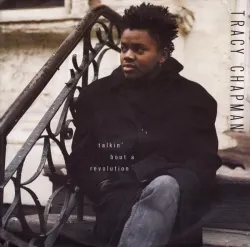
✨ What is 'TaIkin' Bout a Revolution' about ?
- "Talkin' Bout a Revolution" is an anthem from the debut album of Tracy Chapman, touching upon themes of societal inequalities and change.
- Recognize how you might feel like those described in the song, stuck within systemic issues that limit your opportunities for improvement and growth.
- Acknowledge the discomfort but understand its necessity: challenging unfair situations can lead to significant progress.
- Remember, discussions about revolution may start as whispers or feel far-fetched; yet they can quickly gain powerful momentum. You have more power than you think!
- Notice how Chapman warns those upholding current inequalities to “better run” - this lyric emphasizes that unjust systems will eventually be replaced with just ones.
- The underlying meaning of this song reminds us all not only on injustices but also our potential role in fostering positive changes: we have a voice, it matters, and it's time it was heard!
➡️ Let's delve deeper into the meaning of 'TaIkin' Bout a Revolution' 👇
✨ Reflection on a Powerful Anthem
"Talkin' Bout a Revolution" is a stirring track from Tracy Chapman's self-titled debut album in 1988. The song, though not as successful in the United States compared to her former singles, made waves worldwide and became a staple at civil rallies, protests and sit-ins globally. In its essence, this powerful anthem points out societal inequalities while inspiring listeners that change is imminent.
✨ Insights from Historic Anecdotes of Revolution
The lyrics of "Talkin' Bout A Revolution" paint an image of people waiting around for their lives to improve — standing in welfare lines or waiting for promotions. They're caught up in systems that aren't helping them thrive but are simply allowing them to get by.
However, soon whispers begin of revolution – possible change on the horizon. These coming changes are portrayed as being crucial and beneficial primarily for society's less privileged members - the poor who have been held down by systemic issues will finally rise up to claim what should be rightfully theirs.
Notably, calling it 'a revolution' implies significant rather than minor tweaks within existing systems: making way for drastic shifts towards fairness and justice.
In reality too, this song has reverberated during times when real-life revolutions were unfolding such as during Tunisia’s period of civil resistance leading to democratization- further cementing its legacy as an anthem that gives hope amidst despair while demanding substantial societal reform.
✨ Lessons on Empowerment and Systemic Inequality
- Our society often systemically keeps underprivileged groups stuck with limited chances at upward mobility. If you've felt stuck like those depicted within these lyrics remember: acknowledging that there's room (or even need) for improvement can be empowering.
- Challenging unfair situations isn’t comfortable but it’s necessary if we want progress - never underestimate your voice nor your power!
- Change might seem unheard-of until suddenly things begin shifting dramatically:"It sounds like a whisper"- could mean conversations about transformation sometimes start small but can gain momentum.
- Note how the song tells those benefitting from current biases that they "better run"- indicating that any structures upholding inequality will be inevitably replaced by just systems. So, it might not always be easy, but striving for justice is both a noble and practical path.
✨ Influence of Music in Shaping Perspectives
"Talkin' Bout A Revolution" isn’t merely a protest anthem: it's an ode to hope in times of frustration and a stark reminder concerning systemic inequalities plaguing our societies. Chapman's uplifting melody combined with her hard-hitting words inspire individuals to believe in their capacity to bring about meaningful change while nudging listeners towards empathy by highlighting rarely spoken-about struggles of society's marginalized. This song stands as testament - music can indeed influence perspectives!